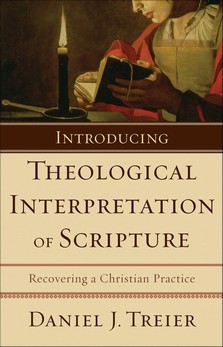Daniel Treier: Introducing Theological Interpretation of Scripture
 Daniel J. Treier, Introducing Theological Interpretation of Scripture: Recovering a Christian Practice (Grand Rapids: Baker Academic, 2008), ISBN 9780801031786.
Daniel J. Treier, Introducing Theological Interpretation of Scripture: Recovering a Christian Practice (Grand Rapids: Baker Academic, 2008), ISBN 9780801031786.
Daniel J. Treier, associate professor of theology at Wheaton College, has written a timely and definitive introduction to the latest theological craze among evangelical theologians and scholars—the so-called “theological interpretation of scripture” movement. Although the writing is clear throughout, the book’s unrelenting polemic against historical criticism is a serious drawback. I say that in spite of the fact that it scarcely could have been written any other way: the theological interpretation movement is all about hostility towards historical criticism.
Treier refers to the approach of the theological interpretation movement as a “new, yet old, way of engaging the Bible” (p. 11). This understanding of the movement’s approach as something “new, yet old” seems to underlie much of the movement’s justifying rhetoric. For Treier, as for others, theological interpretation is both forward-looking (in that it seeks an escape from a certain malaise) and backward-looking (in that it seeks to reconnect with exegetical practices of the past). Implicit in this bifocal approach is a distrust of the historical-critical view of Scripture, a view that theological interpretation proponents associate with Enlightenment ways of thinking. Treier inscribes the forward-looking aspect of the approach in the title to the volume’s introductory chapter (which refers to postmodernism), and he inscribes the backward-looking aspect in the title of chapter one (“Recovering the Past: Imitating Precritical Interpretation”).
Treier outlines some broad hermeneutical rules for what he considers “theological” reading, mostly having to do with maintaining connections with how the church, at one point or another, has read Scripture. In this context, “church” does not seem to signify the whole church, but rather a select set of practitioners of figural reading strategies, reading Scripture through a heavy-handed appeal to the rule of faith.1 In other words, Treier uses the term “church” mostly to signify alternatives to the historical method. This is problematic, of course, given the fact that the historical method, in contradistinction to figural reading, embodies the propositionalist understanding of truth that grounds the gospel message. Treier justifies this “churchly” hermeneutic by calling the church the “community of the Spirit”, as if the Spirit’s role within the church has been to guide its reading practices.
Given what I have just written, it is difficult to judge this book. On some levels, it works as an introduction—for example, the writing is always accessible. On other levels, however, it is a real letdown—for example, its rhetoric against historical criticism can hardly be considered fair. I therefore recommend it as an introduction to the theological interpretation movement, but not as a general guide for reading Scripture.
Reviewed by John Poirier
Notes
1 I call this appeal to the rule of faith “heavy-handed”, because it marks a distinct departure from the intended use of the rule of faith. In place of using the rule to ensure that one’s overall interpretation of the central aspects of the faith is on target [viz. doctrinally orthodox], Treier and others use it in a special way—as a guide for how one reads up front, viz. as a warrant for reading figurally.
Category: Biblical Studies, Pneuma Review, Winter 2010


